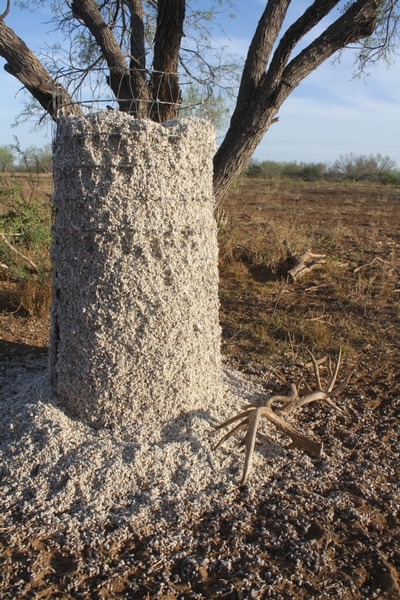
Cottonseed

I often get asked about wholeseed cottonseed as an alternative whitetail deer feed. It has gained in popularity in recent years and here is what you need to know:
Pros: Cottonseed is readily eaten by whitetail (and mule deer) and is very high in crude protein. It is high in fat and oils, is high in digestibility and protein, and little else will eat it (such as raccoons, feral hogs or javelina and most birds). It increases weight gain and body condition quickly, especially in post-rut stress periods.
Cons: Availability and distribution is not widespread and commonplace. Supply depends on cotton production so in drought years, the availability is here today and hard to find tomorrow, which can be an issue when feeding deer. Constantly switching feed, feed type, feed blend and protein content will disrupt the microorganisms and pH levels in the rumen that processes and digest the food. Offering cottonseed for a while, then stopping and restarting over and over, you actually keep the efficiency of the deer's rumen in a state of disruption, resulting in poor digestion, processing and other blood flow issues that negatively affect the deer’s overall health and performance. So if you decide to use it, purchase enough to get the deer from post-rut to velvet antler completion to avoid any potential rumen issues.
The physical handling required of cottonseed can be labor intensive. Wholeseed cottonseed is generally cheaper than most bagged protein; however, it is commonly handled in loose bulk and cannot be put in bulk grain bins like protein or corn. The handling of bulk cottonseed may be too complicated for many properties. Cottonseed cannot be fed from traditional corn or free choice protein feeders due to the fluff and oils so a separate wire mesh cylinder, or commercial feeder, must be used to help contain it. It won't stand up alone, so the cylinder needs to be tall and held upright to provide access and prevent trampling. Bagged cottonseed is becoming more commonplace but still, not many places offer it or offer it consistently. Bagged cottonseed is a bit more expensive, but the extra cost may be worth it if you are not prepared to handle the loose bulk. Finally, cottonseed may, under dire circumstances, create a condition called gossypol toxicity. Gossypol is a chemical found in the seed that will render male animals sterile. Yes, sterile, as in no babies made that year. This condition is temporary, and it usually affects those animals on very poor ranges or in severely overstocked populations. However, the gossypol will leave the animal’s system once cottonseed is removed, and fertility will return in time. Only in rare, severely overstocked, or extremely poor habitats does this occur, but at least be aware of it. Properties with diverse habitats, quality soils, and moderately stocked animals need not worry about the sterility issue. If you are concerned about potential sterility, stop feeding it as the bucks remove the velvet from their antlers. This timing gives the built-up gossypol enough time to pass through the buck's system and leave before he begins producing live sperm. Remember: The only time a buck produces live sperm is while he is in hard antler. Again, the instances of sterility are due to very poor range conditions with overpopulated herds. If you have quality soils, quality browse plants and maintain your density at the carrying capacity of the native range, gossypol toxicity will not be a concern.
If you can overcome the challenges of feeding cottonseed--availability, storage, handling, and potentially stopping it at the right time--it can and will work for you. Cottonseed is a great feed to help restore body condition after a hard winter and for providing protein to growing antlers. It is not considered a complete feed but can work well in conjunction with a balanced protein feeding program. I recommend to use both protein feed and cottonseed in unison to offer your deer the maximum groceries they can consume so that nutrition is never lacking.
Macy Ledbetter, wildlife biologist
www.SpringCreekOutdoors.com
Looking for help with fisheries or pond management, mapping or other wildlife management services? Contact us.
All photo and content herein is copyrighted property of Spring Creek Outdoors, LLC and may not be copied/reproduced or otherwise used in any way without express written permission from Spring Creek Outdoors, LLC. All rights reserved.
Posted in: Supplemental Feeding
